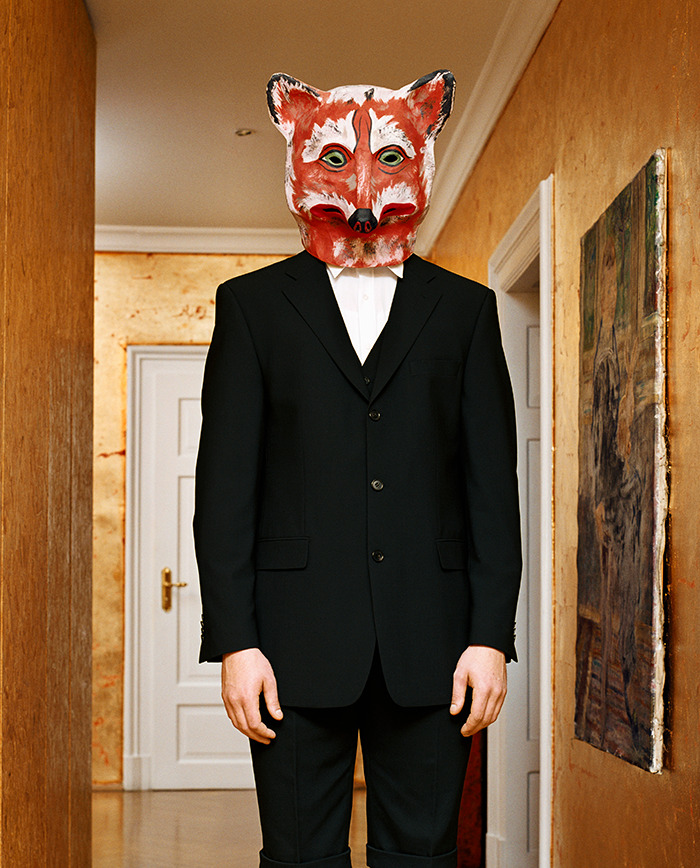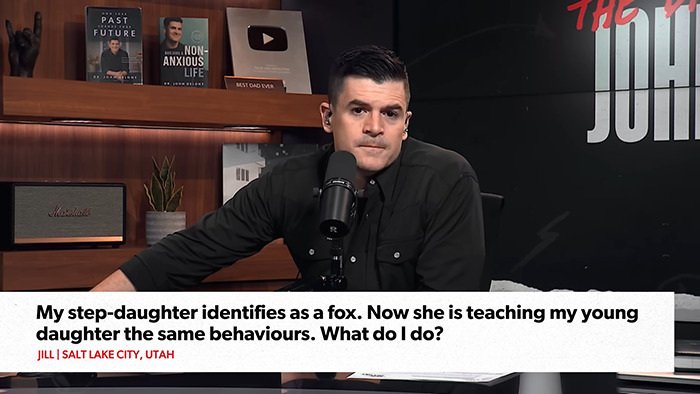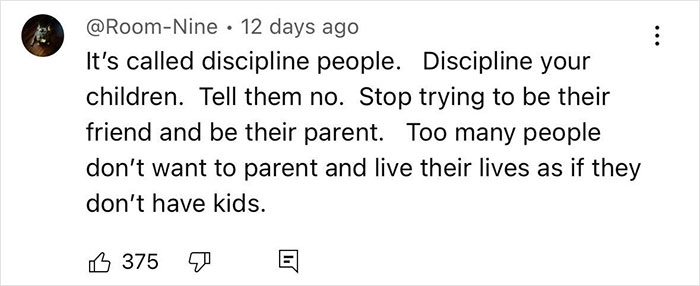A stepmom sought guidance after learning that her teenage stepdaughter identified as a fox and “converted” her own biological daughter into the practice of identifying as an animal. The confession emphasized concerns about boundaries, potentially dangerous online behavior, and the complexities of parenting. A therapist has analyzed the situation for Bored Panda.
Jill, who left other information about her identity and the names of her family members shielded from her testimony, was featured in an episode of The Dr. John Delony Show podcast earlier this month.
In the YouTube video of the segment, Jill sought advice about how to handle her 13-year-old stepdaughter self-identifying as a fox, saying: “She wears a mask and a tail and has a YouTube channel of her jumping around like a fox in really short shorts.”
The exasperated stepmom claimed that the girl’s biological mother was encouraging the behavior at her house and recalled being horrified upon learning that the behavior had an official name: therian.
Jill said: “I’m at a complete loss and I’m shocked and it is a whole thing and there’s a name and there’s terminology and there’s things that are offensive to them.”
Therian Wiki defined modern therianthropy as a deep integral or personal belief that an individual is in some way and to some degree a non-human animal, based upon involuntary, non-human experience.
A stepmom sought help, as her teen stepdaughter identifies as a fox

According to Fiona Hannah, a child and adolescent psychodynamic therapist and clinical director at Teenage Mental Health, this behavior isn’t a common occurrence.
“However, I would also not call it rare. Most of us like to indulge in escapism, such as fantasizing about being famous or wealthy. This is just a version of that, albeit a little out of an adult’s general range,” Fiona wrote to Bored Panda in an email.
In response to the stepmother’s shock, Fiona said an appropriate reaction would be to find out as much information as possible about the therian culture so that she can have supportive and helpful conversations with the child.
“Simply banning and shutting it down as wrong would only alienate the child and cause more division between her and the child,” the expert added.
In her desperate plea to mental health podcaster John Delony, Jill further revealed that the stepdaughter had converted her own nine-year-old biological daughter into a therian — with her now identifying as a giraffe.
The stepdaughter had also made and posted a video with Jill’s two “young kids” over Christmas, which the parents learned about at a later stage, prompting the desperate mother to ask John if she should let her own daughter “continue to be a giraffe” amid the potentially inappropriate use of social media, particularly YouTube.
“I can understand how it would be [a concern] for her; however, the nine-year-old is simply responding to something she is seeing an older child doing, and as she looks up to her, leading her to explore whether it is something she wants to be part of, much like fashion, we all want to try things on for size when we see someone else with it. It doesn’t mean it works for us,” Fiona explained.
A therapist told Bored Panda that children pretending allows them to explore their identity, but posting about it online could be a safety concern

“A nine-year-old is simply working out their place in the world. Therefore, they will mimic and copy anyone of influence around them, including older idealized siblings,” the clinician added.
In her exchange with the podcaster, Jill continued to assert her worry, asking: “More importantly, what rules do I have in place in my home about the internet and screens and social media?
“And can I tell my stepdaughter that her cell phone’s not allowed here?
“And overall, big picture, what kind of relationship should I have with my stepdaughter?
“Since I’m not her bio parent, but so much of her influence is over my house, and my daughter, who’s absolutely in love with her, adores her, and I’m sure a big reason my daughter’s doing this is to gain good favors with the stepdaughter.”
While John admitted that he didn’t worry when his own eight-year-old daughter regularly played make-believe while dressed up as a princess, noting the behavior was healthy and normal, he did express some concern, saying: “If your kid wants to dress up like a giraffe and run in the backyard, I don’t have an inherent problem with that, understanding that she’s not going to dress like a giraffe when we go out to dinner.
“She’s not going to dress like a giraffe when friends come over.
“Because you don’t ‘identify as,’ that language is just madness.
“It’s so strange that we’re even having this conversation.”
The stepmom, Jill, shared her testimony on The Dr. John Delony Show podcast

Jill went on to explain that her husband was seemingly ok with his daughter’s behavior but added that the father had said “absolutely not” to her having a YouTube channel months ago, which was launched by the biological mom and the daughter regardless.
“The stepmother’s belief that there will be sexualization of the child’s behavior by those that view it online, I believe, is valid, as it would be a concern that a child is parading themselves on YouTube channels dressed in what many may perceive as a provocative manner,” Fiona told Bored Panda.
She continued: “If YouTube channels are not being monitored appropriately by a parent, a child is at risk of grooming or sexual coercion, regardless of what their channel content is; therefore, I agree with her.
“Any 13-year-old having a YouTube channel could be at risk of an [in]appropriate sexualized adult attention.”
During the podcast segment, John was stunned to learn that the therian daughter had live-streamed herself, with the vast majority of viewers being, in all likelihood, “adult men.”
“When you hand a kid a smartphone, you’re not giving them access to the world — you’re giving the world access to them,” the podcast host said.
Beyond safety concerns, John went on to explain that amid the rapid physical changes of early adolescence, kids wanted to know about their parents: “Do you see me? Do you see all of me? And do you really love me?”
To which Jill replied: “My heart breaks for her, that’s exactly what she says, is she doesn’t feel seen or heard by the adults in her life. You know, she’s in therapy and stuff.”
You can watch the segment below:
According to Fiona, it is not unusual to pretend to be something you are not. She explained: “Think of people who catfish or alter photos to look better. We all present ourselves differently depending on our environment and our need to be liked.
“Children pretending to be something they are not allows them to explore and find their own identity.
“In my opinion, I would only regard this as abnormal if it was impacting the child’s ability to sustain and engage in healthy relationships or behaviors and manage their normal life appropriately.”
As for the internet, screens, and social media rules in the house, the child and adolescent psychodynamic therapist highlighted parents’ common sense, saying: “Your children are nine and 13; therefore, [they] should not be allowed unfettered access to the internet 24/7.
“Sensible monitoring and education around the internet is always best with children so that they are able to self-censor their time on it, and if they are unable to, the parents should establish appropriate and sensible boundaries for internet use.
“Parents should also endeavor to model good behavior around these things, i.e., there is no point banning your children from using the internet, and then they spend all their free time glued to their screens.”
When it comes to boundary concerns within a step-parenting relationship, Fiona explained that in the case of Jill, since it is her home, she is well within her rights to impose house rules as she sees fit.
“However, [she] should not be surprised if her stepdaughter then refuses to visit,” the mental health expert added. “I would suggest a sensible informed internet use policy in the home, where smartphones are allowed but with set boundaries that are agreed by all adults in advance.”
Fiona went on to elaborate on the relationship between Jill and her stepdaughter, stating: “She is not the child’s parent; therefore, how their relationship evolves is governed not just by her but also the child’s parents.
“If they want her to have a significant role in their child’s life, the parents should support her to build a trusted and mutually respectful relationship with her. However, if they are not keen on her being involved in their child‘s life, they should be clear about this and not give ambiguous messages about their expected role for her in their child’s life.”
Jill’s testimony ignited heated reactions on social media
















